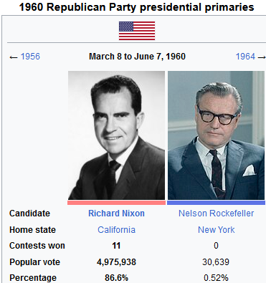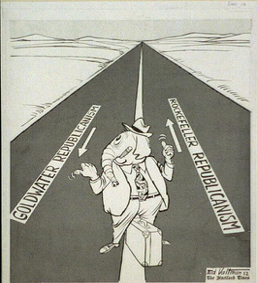The Rockefeller Plan for Federal Aid to Education — No Real Choice
In the 1964 edition of A Choice Not An Echo, Phyllis Schlafly described her chance discovery of a 1957 meeting of what Phyllis called “kingmakers” at St. Simons Island. She exposed the Rockefeller political machine that U.S. Senator Barry Goldwater (R-AZ) confronted when he announced his 1964 candidacy for the Republican presidential nomination in the primary election against New York’s Governor Nelson Rockefeller.
Before Nelson’s youngest brother David — president of Chase Bank and the youngest grandson of John D. Rockefeller — launched his invitation-only “kingmaker” group (the Trilateral Commission), he was involved in steering America’s national political system to select the Republican party’s presidential nominee at this secret meeting. Also present was Henry Kissinger, a Harvard professor and director of a Special Studies Project for the Rockefeller Brothers Fund. 1
 Nelson founded the Special Studies Project the year before (1956) when he became president of the fund, taking over leadership from his older brother, John D. Rockefeller III. 2 The panel reports generated by the project would serve as the platform for Nelson Rockefeller's 1960 presidential campaign. 3 Included in the project was a subpanel V on U.S. utilization of human resources.
Nelson founded the Special Studies Project the year before (1956) when he became president of the fund, taking over leadership from his older brother, John D. Rockefeller III. 2 The panel reports generated by the project would serve as the platform for Nelson Rockefeller's 1960 presidential campaign. 3 Included in the project was a subpanel V on U.S. utilization of human resources.
The report from subpanel V, titled “The Pursuit of Excellence: Education and the Future of America,” was authored by the chairman of the subpanel, John W. Gardner, president of the Carnegie Corporation of New York. 4 After Goldwater’s defeat in the general election, Gardner would become Lyndon Johnson’s Secretary of Health, Education and Welfare and the engineer of Johnson’s “Great Society.” 5
Gardner oversaw passage of the landmark Elementary and Secondary Education Act of 1965 (currently named the Every Student Succeeds Act) that redefined the federal role in education. The implication is that, despite Nelson Rockefeller’s loss to Barry Goldwater in the Republican primary election, when Johnson defeated Goldwater, Rockefeller’s Federal education policies were implemented in the Johnson administration by the author of Rockefeller’s education platform.
Invisible primaries conducted by invisible people
The St. Simons meeting agenda included conducting an “invisible primary” whereby party kingmakers selected the candidates they wanted the public to elect. Phyllis began Choice by explaining that “kingmakers” had been robbing the American people of their constitutional birthright to a presidential election choice since 1936. At stake was control of annual federal spending, yet “the press is strangely silent” about the heists. In other words, she opened the book with a clear understanding that what she discovered was not new but was always unconstitutional.
Party insiders (elected officials, donors, interest groups, activists, and political staffers) associated with both major American political parties have been pre-selecting nominees since the 1790s. Insider deliberations take place through private conversations among themselves and with the potential candidates. Eventually they make public declarations of their candidate choices to support with endorsements, money, and manpower before the public begins voting.
Hans Noel, co-author of The Party Decides: Presidential Nominations Before and After Reform, went on record stating: “These people who have a stake in the outcome aren’t going to just let it play out. They’re going to try to rig it in their favor.” 6 And so it was with Nelson Rockefeller, who would become the Republican governor of New York the following year. Nelson had “an insatiable lust for the Presidency.” His bid for the governorship was a step in the process to position himself against the conservative Republican incumbent vice-president Richard Nixon in the 1960 Republican presidential primary. 7
Rockefeller gave Nixon no choice — so Goldwater gave America a choice
Nelson Rockefeller withdrew his candidacy after losing 11 primary contests to Nixon. 8 He lost the contest, but not control of the Republican party. He refused to support Nixon as the Republican nominee and demanded that Nixon submit Rockefeller’s platform to the Platform Committee at the convention.
Knowing full well that Rockefeller was head of the largest delegation to the Republican convention, Nixon capitulated to Rockefeller, who let it be known that if the committee ignored his program, he would take the fight to the convention floor. 9, 10 Senator Goldwater described Nixon’s agreement as a “surrender to Rockefeller” and said “the entire convention had been the victim of an ‘unprecedented last-minute attempt’ to impose a platform dictated by a spokesman for the ultra-liberals.’” 11 Among the Rockefeller-Nixon platform items that were unacceptable to Goldwater was the proposal for federal aid to education — an idea he denounced in his 1960 book, The Conscience of a Conservative. 12
When the Nixon-Lodge ticket narrowly lost the election to the Kennedy-Johnson ticket, Goldwater made it clear he did not want Nelson Rockefeller nominated as the Republican candidate in 1964. 13 Rockefeller’s cronies were undeterred, and the Rockefeller-Goldwater schism that began in 1960 set the stage for the dramatic Republican Revolution Goldwater led in 1964 to break Americans free from the elitists referred to as Wall Street Republicans or New York kingmakers. 14, 15
Goldwater Republicanism v Rockefeller Republicanism — a forced choice
On Nov. 7, 1963, Rockefeller announced his second bid to become the Republican presidential nominee stating, “I believe that vital principles are at stake (emphasis added).” 16
 With the country still reeling from the Kennedy assassination and Johnson’s assumption of the presidency on November 22, 1963, Goldwater countered Rockefeller’s “principled” rationale by announcing his candidacy in January 1964. 17 Goldwater retorted, “I will offer a choice, not an echo. This will not be an engagement of personalities. It will be an engagement of principles.” 18
With the country still reeling from the Kennedy assassination and Johnson’s assumption of the presidency on November 22, 1963, Goldwater countered Rockefeller’s “principled” rationale by announcing his candidacy in January 1964. 17 Goldwater retorted, “I will offer a choice, not an echo. This will not be an engagement of personalities. It will be an engagement of principles.” 18
The choice Goldwater offered Americans was a choice between Rockefeller Republicanism, that is, progressive, big government policies (which were aligned with Johnson’s policies) and “an opportunity to choose conservative leadership.” 19, 20, 21
Nelson Rockefeller’s progressive social policies of Federal aid to education and medical care were essential to his supporters in New York but they did not play well with Republicans in the states between New York and California. 22
Goldwater won several key primary victories and was nominated on the first ballot at the Republican convention in July 1964. 23, 24 But in the general election against Lyndon Johnson, Goldwater’s vote against the 1964 Civil Rights legislation on the grounds that parts of it were unconstitutional put him in an unfavorable position with Black voters and members of his own party. 25 Goldwater had supported the Civil Rights Acts of 1957 and 1960 but objected to the Title II and Title VII provisions of the 1964 legislation. 26 His efforts to defend his vote were not effective. When Johnson defeated Goldwater, Martin Luther King declared, “The American people made a choice ... to build a great society, rather than to wallow in the past” (King, “A Choice and a Promise”). 27
Footnotes:
Want to be notified of new
Education Reporter content?
Your information will NOT be sold or shared and will ONLY be used to notify you of new content.
Click Here
Return to Home Page
